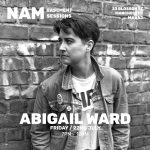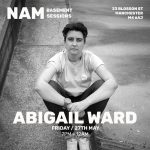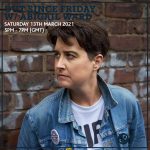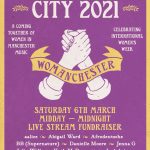[From the vaults: an interview with Dutch Uncles for The Chimp, 2011]
A whitewashed room containing little more than an unclothed mannequin in a distractingly come hither pose seems like a fitting place for to be meeting Marple’s arch pop aesthetes Dutch Uncles – a band whose reputation for visual flair and musical mischief precedes them.
Irresistible to A & R men from outset, Dutch Uncles were picked up in 2008 by German label Tapete for a one-album deal just three months after their first gig in Manchester. Since then, they’ve toured with The Futureheads , remixed Bombay Bicycle Club and scored a management deal with local label Love and Disaster, who put out ‘The Ink’ – a strikingly packaged seven inch reminiscent of classic XTC.
In summer of last year, the band recorded a World Cup song – a multi-layered a cappella in which the individual names of the England squad are repeated in time signatures dictated by their shirt numbers. To further boggle the mind, each player’s name is panned to a stereo position within the track that corresponds to his actual position on the playing field. The song, entitled Fabio Capello (whose name does not feature), made it onto NME radio within ten minutes of being mastered, and sounds like Laurie Anderson presenting Match of the Day.
It’s perhaps no surprise, then, that a band as musically obdurate and inventive as this would eventually be courted by Memphis Industries, one of the hottest indie labels in the land, and home to fellow math-poppers Field Music, with whom the band feel a close musical kinship.
Singer Duncan and bassist Robin explain how they came to mint this deal: “It started out as a friendly email sent after we put out The Ink, Duncan says. “It just read, ‘Like the new track. Keep up the good work’. Then we sent them an album sampler, which they liked.”
Robin: “Then they came up to the studio in Salford where we were recording and bought us pizza, and we played them unfinished MIDI tracks.”
Duncan: “Anyway, they were into it and we instantly knew we wanted to go that way. We’re big fans of Field Music and they’ve always been an influence on our writing style, so I think the fact that they had them and the Go! Team meant that we knew this was a label that holds onto bands and develops them, unlike most major labels.”
Listening to the new album, Cadenza, which evokes the sonic playfulness and ambition of band like Sparks and King Crimson, it’s obvious that the band are keen to fly in the face of the traditional meat-and-potato Manchester lad-rock sound. In fact, bending avant-garde disciplines into fun pop shapes could be described as their raison d’etre. On the track X-O the band have replayed movements from minimalist composer Steve Reich’s Electric Counterpoint. A daring cover, if ever there was one.
Duncan explains, “We saw that as a challenge. It was something we spoke about very drunk one night. We just thought: this track is amazing…” Robin interjects: “Let’s turn it into a pop song!” Duncan again: “I hated every day of trying to write the lyrics. I just thought, ‘I’m murdering a classic instrumental here, it shouldn’t really have lyrics at all, who do I think I am?’ But it’s worked out really well. It adds a character to the album that we would never have been able to pull off completely on our own.”
Duncan also spent time developing a lyrical aesthetic to complement the complex instrumentation and shifting time signatures of Cadenza: “I’ve always admired the way David Byrne writes, how he’s almost in a trance when he’s singing. You almost feel like his eyes are rolling back in his head. He’s removing himself from the situation and just analysing what he’s doing. I’ve tried to develop a style of removing myself from my own emotions.”
Having just come back from a tour with joyful noise mongers Young British Artists, and boasting firm friendships with the likes of Everything Everything and Delphic, do Dutch Uncles think that a new Manchester scene, unfettered by the past, is emerging?
Robin: “There’ll always be those people who want to go and see Beady Eye at the Apollo – a load of knobheads, really. The Fac 251 club is still just digging up the past – we’d never play there. Peter Hook’s a wanker for bringing all that stuff down. But we don’t feel suffocated by it. There is a present, and it’s great.”
Duncan adds: “Everything Everything made one of the best albums of last year – they’ve given us a few breaks along the way. Egyptian Hip-Hop are also great. They’re probably our best ‘band’ friends. That whole Marple connection is pretty strong!”
This spirit of collaboration and co-operation has undoubtedly played a part in Dutch Uncles’ rapid evolution. Robin describes the Love and Disaster label as “like extended family”. The band are also keen to big up local graphic design collective Dr. Me, who have given the Cadenza album its unique physical identity.
“Artwork is very important to us”, says Duncan. “We’ve used a lot of bold, simple colour with our previous releases so we wanted to do something different for this one. We’ve gone for more of a collage this time. Dr. Me are the best friends I’ve had since I moved to town. It’s kind of extending the Love and Disaster family again. We’re so lucky. It’s incredible the way the best people for the job were also the closest people.”
So how keen are the band to crossover into the pop mainstream? Would they, for example, play Top of the Pops, should its rumoured return come into fruition?
“Well, I’d rather play The Old Grey Whistle Test!” Duncan admits. “I think any band that’s going to survive over time needs to have a breakthrough song, even if it’s just the one. Every band needs a ‘Making Plans For Nigel’. At this point he grows serious. “But in terms of overall ambition, I just want to make this my life.”
As the rest of the band arrive for the photo shoot and begin grabbing Ms Mannequin in inappropriate places, talk turns to their most treasured albums. Duncan eventually chooses Television’s Adventure whilst Robin goes for Discipline by King Crimson. Adventure and Discipline. Seems appropriate. The Dutch Uncles manifesto.
Originally written under the pseudonym Harper Hay.






Comments by Abigail Ward